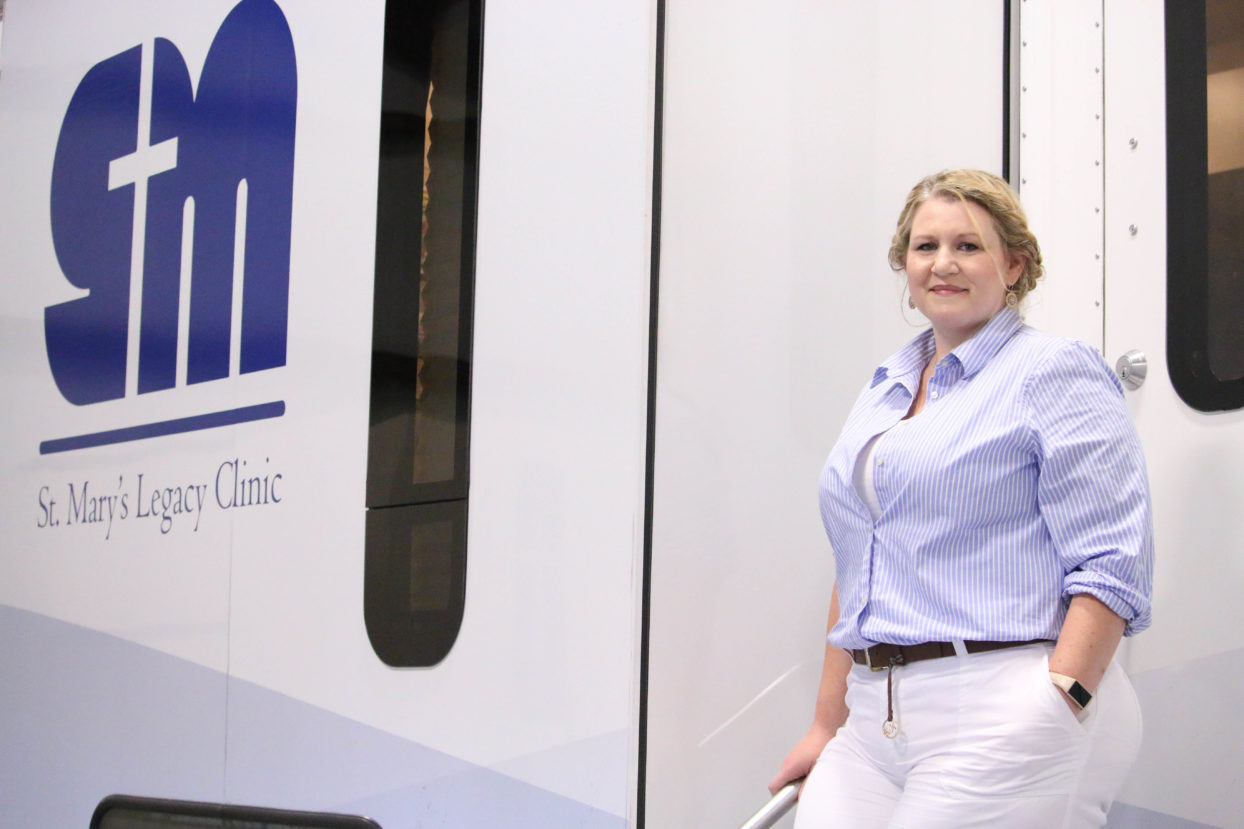By Bill Brewer
St. Mary’s Legacy Clinic has named a public health scholar to be its next executive director, who will work with founder and medical director Sister Mariana Koonce, RSM, to continue delivering free medical care to rural East Tennessee.
Brandy Fuesting, who will receive her doctorate in public health from the University of Tennessee this fall, will oversee the day-today operations of the clinic from its offices at the Church of Divine Mercy in West Knoxville.
Mrs. Fuesting joined the clinic in July following an extensive search conducted by Sister Mariana, a physician who also has been serving as executive director.
“I am so excited to have Brandy as the new executive director of the St. Mary’s Legacy Clinic. She is exactly who the clinic needs to move forward into the future,” Sister Mariana said.
Mrs. Fuesting and her husband and daughter are parishioners at St. Mary in Oak Ridge, where her daughter attends school.
Her husband is on active duty in the military, but will retire in October. She also worked with the military in sexual violence prevention and response at the Marine Corps headquarters in Quantico, Va.
She has a bachelor’s degree from Troy State University in psychology and a minor in business, and a master’s degree in public health from Capella University.
“A lot of my background is in child protective services and social behavioral health. Then I went to work for the military in sexual violence prevention and response,” Mrs. Fuesting said.
The Fuestings landed in East Tennessee when Maj. Fuesting was assigned as an assistant professor of military science at Carson-Newman University and Lincoln Memorial University as part of the military ROTC program.
To keep the family close together, she applied to the University of Tennessee Department of Public Health and was accepted into the program. And in 2017, she worked for Helen Ross McNabb Center on a grant program for substance abuse treatment.
She was introduced to the Catholic community and became active in St. Mary activities and familiar with the Diocese of Knoxville and the St. Mary’s Legacy Clinic.
“When the position at St. Mary’s Legacy Clinic came open, it really seemed like God’s will to continue working with the diocese and the East Tennessee community,” Mrs. Fuesting said.
“We can affect people’s lives in so many ways here. We can help health disparities and education disparities,” she added, noting that her work with Helen Ross McNabb “really drove home” the socioeconomic issues and disparities in income and education in East Tennessee.
She said the Helen Ross McNabb project reminded her of work she did in native Alaska communities, where there was a lack of resources.
“The St. Mary’s Legacy Clinic goes where people need us. We meet them at their levels where they need health care. How far the clinic has come in just over five years is very impressive. And the commitment of the volunteers is just amazing,” she said.
Mrs. Fuesting said she has a strategy for helping the clinic develop more relationships in the community that should benefit its mission and ministry.
“General family practice is decreasing in our rural communities as well as specialties and hospitals. They’re decreasing and not available in the communities that St. Mary’s Legacy Clinic serves,” Mrs. Fuesting said.
“I would like to increase our partnerships in the community starting with the University of Tennessee. When new research comes out, it can be hard to access. Academia is always on the cutting edge. I would like to be the bridge between research and practice,” she added.
She noted that bridging that gap is only possible through a strong relationship between the academic community and the practice community.
“That is a strength I bring that I hope will complement all that Sister Mariana has done. The research background I bring will help us understand how far we’ve come and help us evaluate our current status and plan for the future,” she said.
As she finishes up her doctorate in public health, she already has started working on building the partnership with UT and professors there with specialties in community health education, epidemiology, and health disparities, with a specialty in East Tennessee.
The mobile clinic, which went into operation in 2014 after being commissioned by Bishop Richard F. Stika, is staffed by more than 70 volunteer physicians, nurses, and community members.
It’s described as a “family doctor’s office on wheels” that provides primary medical care to East Tennesseans who have no access to health care. The clinic provides care for urgent health needs and chronic conditions.
According to its mission statement, the clinic and its staff “believe in the healing ministry of Jesus Christ and in continuing the legacy of the Sisters of Mercy by providing health care to the poor and medically underserved in the rural areas of East Tennessee.
The clinic makes regular visits to Washburn, Decatur, Crab Orchard, Athens, Rutledge, and Gatlinburg.

